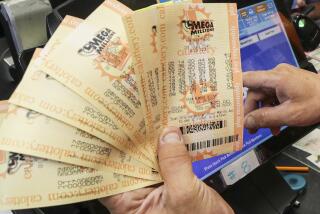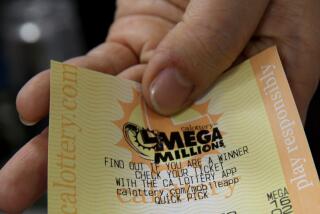Lottery Hype
- Share via
California has a new lottery director, but that does not indicate any major change in direction for the state’s dubious venture into profiting from gambling. This is not necessarily the fault of director Chon Gutierrez, a veteran state bureaucrat chosen by Gov. George Deukmejian to take over the lottery system created by voter initiative in 1986. The problem is the inherent and ever-escalating need to hype the lottery and expand its marketing base to keep the dollars flowing in.
To Gutierrez’ credit, he does not want to encourage people to play if they cannot afford it. Unfortunately, national studies indicate that poor people and those identified as members of the working class spend a greater proportion of their earnings on lotteries than do the more affluent. According to two lottery experts at Duke University, 15% of adults in low-income households in one state, which was not identified, spend $10 or more a week each on the lottery. If the California lottery is to substantially increase its weekly take, it will have to do two things: Get those who now play to play more often, and attract betting by those who do not now participate. Either way the lottery will continue to depend to an inordinate degree on people who can least afford it.
Experience already has shown that California is following the pattern of other states in struggling to keep sales propped up. It is doing this through more aggressive marketing and by introducing more new games. Current lottery ads hysterically attempt to entice players with the lure of becoming instantly rich and famous. And the lottery is expected to expand to a twice-a-week numbers game this fall. Currently there is one drawing a week, on Saturdays. An additional game would be conducted on Wednesdays.
Gutierrez recognizes the obligation of the state to run the lottery in a responsible fashion, and is not merely interested in breaking sales records. Good. One place to start is to tone down the radio and television ads and make them more honest, perhaps by quoting the odds on becoming a millionaire. Go back, even, to the idea of the lottery helping the schools, although the lottery revenues have had a minimal effect on school budgets.
Before the state leaps into an escalation of lotto games, it might do some more intensive studies about who is going to bet those extra dollars. Gutierrez notes that the California lottery is so new that officials lack reliable data on who plays and why. Such information should be available in other states, however. It is well to remember that while roughly 34 cents out of every $1 bet on lotto goes to benefit schools, for some California families a full $1 out of every $1 bet should be going for that family’s food, housing or clothing. That is a dubious way for state government to be helping people.
More to Read
Sign up for Essential California
The most important California stories and recommendations in your inbox every morning.
You may occasionally receive promotional content from the Los Angeles Times.










